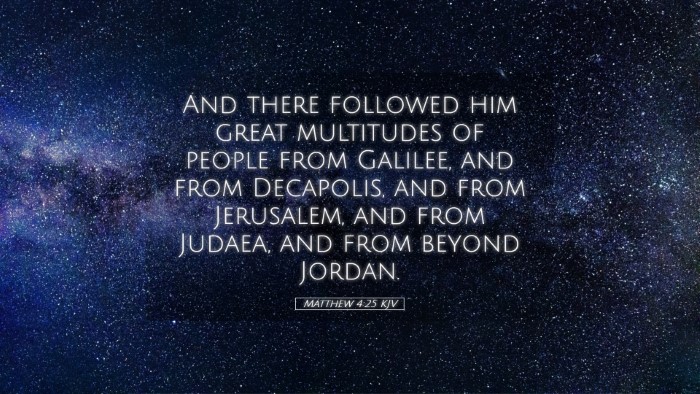Commentary on Matthew 4:25
Verse: "And there followed him great multitudes of people from Galilee, and from Decapolis, and from Jerusalem, and from Judaea, and from beyond Jordan."
Introduction
The calling of the first disciples, the ministry of Jesus, and the teaching in the synagogues drew significant attention and large crowds. Matthew 4:25 encapsulates the early impact of Jesus' ministry, revealing not only his growing popularity but also the varied demographics of his followers. In this commentary, we draw insights from prominent public domain commentaries by Matthew Henry, Albert Barnes, and Adam Clarke to explore the implications of this verse.
Analysis of the Text
The verse indicates a significant moment where Jesus begins to attract a diverse group of people:
- Great Multitudes: The term 'great multitudes' suggests a massive gathering, highlighting the magnetic nature of Jesus' ministry.
- Geographical Scope: The mention of various regions—Galilee, Decapolis, Jerusalem, Judea, and the area beyond Jordan—illustrates the extensive reach of Jesus' influence and the universal appeal of his message.
Diverse Audience
According to Matthew Henry, the diverse multitude symbolizes the inclusivity of Christ's call. It is a precursor to the Great Commission, where the Gospel's message extends beyond geographical and cultural boundaries. The followers consisted of:
- Galilee: Known for its mixed population, reflecting both Jewish and Gentile cultures.
- Decapolis: A group of ten cities known for their Hellenistic culture, often representing Gentiles.
- Jerusalem: The religious hub where the Jewish leaders resided, indicating that even the Jewish elite were beginning to take notice.
- Judea: The heartland of Jewish life, demonstrating that Jesus’ ministry was deeply rooted in Jewish tradition.
- Beyond Jordan: Those from the eastern side of the Jordan River, further emphasizing the diverse background of the followers.
Spiritual Significance
Albert Barnes highlights that the gathering of such a multitude was not merely for entertainment but was indicative of a deeper spiritual hunger. The people's willingness to follow Jesus from various regions signifies:
- A Desire for Healing: Many were seeking physical and spiritual healing, propelled by Jesus' miracles.
- A Search for Truth: The authority with which Jesus taught drew those hungry for a genuine understanding of God's Word.
- Religious Reform: The discontent with the existing religious leaders’ practices drove many to seek Jesus as a new hope for spiritual rejuvenation.
Jesus’ Compassion
In the commentary provided by Adam Clarke, there is an emphasis on Jesus’ compassion toward these crowds. Clarke suggests that the large followings likely put a strain on Jesus, yet he never turned anyone away. This now sets the stage for the Sermon on the Mount, where Jesus addresses both physical and spiritual needs:
- Meeting Needs: Jesus took time to address the needs of the masses, asserting the significance of pastoral care.
- Model for Ministry: Pastors and leaders today can draw from this example to prioritize compassion when tending to their congregations.
Theological Implications
This verse illustrates several key theological implications:
- Christ's Authority: The attraction of the crowds underscores Jesus' authority as the Messiah, fulfilling Old Testament prophecies concerning His identity.
- Universal Gospel: The diversity of the audience foreshadows the future expansion of the Gospel to all nations, aligning with the Great Commission in Matthew 28:19-20.
- The Call to Discipleship: Those who followed Jesus were not just casual observers; they were stepping into a transformative relationship with Him.
Application for Today’s Believers
For contemporary pastors, students, theologians, and Bible scholars, Matthew 4:25 serves as a potent reminder of the importance of engaging with diverse communities:
- Evangelistic Outreach: Just as Jesus drew followers from all walks of life, the church is called to reach out to varied populations.
- Embracing Diversity: Understanding that the Kingdom of God is inclusive prompts believers to cultivate a welcoming environment.
- Responding to Needs: Following Christ’s example, believers should aim to address both spiritual and physical needs in their communities.
Conclusion
Matthew 4:25 encapsulates a pivotal moment in the early ministry of Jesus, revealing his profound impact on a wide array of people. Through the insights drawn from public domain commentaries, we recognize the significance of diversity in His followers and the spiritual principles at play. This verse serves as an admonition to all believers to embody Christ’s compassion and to foster inclusivity while reaching out to a world in need. It is an invitation into a deeper understanding of discipleship and a call to action for the church today.


